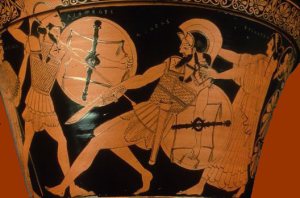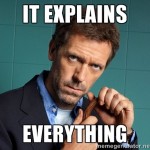If you have never seen that sight, then suspend your decision about the propriety of devil-worship, and the expediency of conciliating the devil.
— Herman Melville, Moby Dick
Watching Bill Moyers’ interview of Huston Smith at church last Sunday, we came across a part of the interview where Huston is explaining that “God is one” and that, therefore, all religions are, at their heart, one. I’ll be honest, this kind of ecumenical talk never really resonated with me — not doubt because I was raised in a religion that insisted on its uniqueness. But today, the issue which struck me as strange was the inherent monotheism of Huston Smith’s message. Smith himself is a Christian and I think he may have a tendency to project a monistic vision onto the world’s religion that a Hindu, for example, might not see.
I was going to write that I must have come a long way from my Christian upbringing to find monotheism strange. But now that I think about it, perhaps I have not had to come so far after all. Mormons are not strictly monotheists. They are not Trinitarians, but believe the three figures of the Godhead are separate individuals. In addition, Mormons are “pluralists” — kind of henotheists — rather than monotheists. They believe in an infinite number of worlds and and infinite number of gods for those worlds. I’m not going to get into the profundities Mormon theology here, but suffice it to say that many Christians would probably consider it a small jump from Mormonism pluralism to Neopagan polytheism.
Anyway, as I listened to Huston Smith, it struck me as strange that monotheists start with a propositions that God is one, God is good, and God is all-powerful and then spend the rest of their time struggling to explain the problems created by that set of assumptions — namely theodicy, the problem of evil. I never really found any of the explanations satisfactory. But I wonder why more people don’t question the basic assumptions.
When I speak of polytheism, I don’t mean a literal belief in divine beings, but rather a belief that the forces which forces that control our fate, those forces which are beyond human control, are not one, but many. Whether we call them gods, nature, immensities, or whatever, it seems to me that it makes sense to conceive of these forces as multiple and often contradictory. Life seems to be more likely to be the product of the whims of the warring gods of Olympus than a benevolent Father-in-Heaven.
The Iliad seems to be a better analogy for life than the Book of Job. The Iliad describes the Trojan War in which different gods aid different sides at different times. Hera, Athena, Hermes, and Poseidon aid the Achaeans, while Artemis, Apollo, Aphrodite, and Ares aid the Trojans — and Zeus aids both sides at different times. The influence of these heterogeneous deities accounts for the conflict and the rise and fall of providence in the Iliad. In contrast, in the Book of Job, we are to believe that the Lord (Yahweh) is in charge at every point, even when he allows Satan to persecute his favored subject. The Iliad just makes more sense to me.

So what is the appeal of monotheism? Why is it so important to believe that God is one, even when that belief creates so many theological problems? To phrase it another way, what do we give up when we give up the insistence on monotheism?
One thing we give up when we embrace polytheism over monotheism is the assurance that order will prevail over chaos. We give up the belief that justice and goodness will ultimately prevail. And that is no small thing.
Nietzsche wrote in The Gay Science:
“You will never pray again, never adore again, never again rest in endless trust; you do not permit yourself to stop before any ultimate wisdom, ultimate goodness, ultimate power, while unharnessing your thoughts; you have no perpetual guardian and friend for your seven solitudes; […] there is no avenger for you any more nor any final improver; there is no longer any reason in what happens, no love in what will happen to you; no resting place is open any longer to your heart, where it only needs to find and no longer to seek; you resist any ultimate peace; you will the eternal recurrence of war and peace: man of renunciation, all this you wish to renounce? Who will give you the strength for that? Nobody yet has had this strength!”
What do we gain when we give up monotheism for polytheism? Well, evil no longer needs to be explained, for one. In terms of trade offs though, I have to admit, monotheism does seem more appealing. I would take theodicy if I could have an “avenger and final improver”. Problem is, I just can’t buy it anymore. The idea is so discordant with my own experience, I can’t even bring myself to hope for it.











